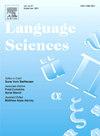The situatedness of aesthetic emotions: a review of the literature and a proposal for its study in variationist linguistics
IF 1.1
2区 文学
Q2 EDUCATION & EDUCATIONAL RESEARCH
引用次数: 0
Abstract
This paper explores the situatedness of aesthetic emotions, emphasizing their cultural, historical, and contextual variability. It critiques the Western-centric framework that often dominates the study of aesthetic emotions, arguing for a more inclusive approach that recognizes the influence of diverse cultural practices and beliefs. The paper identifies key research gaps, including the need for a comprehensive lexicon of aesthetic emotions across languages, the impact of social and cultural factors on aesthetic evaluations, and the historical evolution of aesthetic emotion expressions. It integrates insights from psychological constructionist models, which view aesthetic emotions as emerging from the interplay of prior knowledge and contextual cues, rather than from a universal affective core. The study employs a sociocognitive framework and a corpus-based onomasiological methodology to analyze metaphorical patterns related to aesthetic emotions in multiple languages, including Spanish, English, Old English, and Japanese. The findings highlight the importance of linguistic diversity and cultural context in shaping aesthetic experiences. By addressing these gaps, the paper aims to contribute to more inclusive theories and models that reflect human diversity, ultimately informing broader debates on multiculturalism and inclusivity in the study of aesthetic emotions.
审美情感的情境性:变异语言学研究的文献综述及建议
本文探讨了审美情感的情境性,强调其文化、历史和语境的可变性。它批判了通常主导审美情感研究的以西方为中心的框架,主张采用一种更具包容性的方法,认识到不同文化习俗和信仰的影响。本文指出了主要的研究空白,包括对跨语言审美情感综合词汇的需求,社会和文化因素对审美评价的影响,以及审美情感表达的历史演变。它整合了心理建构主义模型的见解,该模型将审美情感视为来自先前知识和上下文线索的相互作用,而不是来自普遍的情感核心。本研究采用社会认知框架和基于语料库的象形学方法,分析了西班牙语、英语、古英语和日语等多种语言中与审美情感相关的隐喻模式。研究结果强调了语言多样性和文化背景在塑造审美体验中的重要性。通过解决这些差距,本文旨在为反映人类多样性的更具包容性的理论和模型做出贡献,最终为美学情感研究中关于多元文化主义和包容性的更广泛辩论提供信息。
本文章由计算机程序翻译,如有差异,请以英文原文为准。
求助全文
约1分钟内获得全文
求助全文
来源期刊

Language Sciences
Multiple-
CiteScore
2.90
自引率
0.00%
发文量
38
期刊介绍:
Language Sciences is a forum for debate, conducted so as to be of interest to the widest possible audience, on conceptual and theoretical issues in the various branches of general linguistics. The journal is also concerned with bringing to linguists attention current thinking about language within disciplines other than linguistics itself; relevant contributions from anthropologists, philosophers, psychologists and sociologists, among others, will be warmly received. In addition, the Editor is particularly keen to encourage the submission of essays on topics in the history and philosophy of language studies, and review articles discussing the import of significant recent works on language and linguistics.
 求助内容:
求助内容: 应助结果提醒方式:
应助结果提醒方式:


